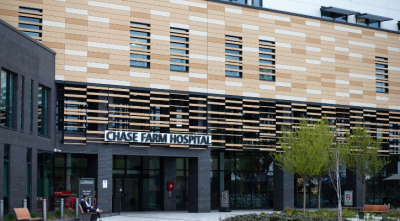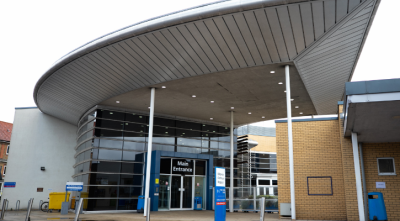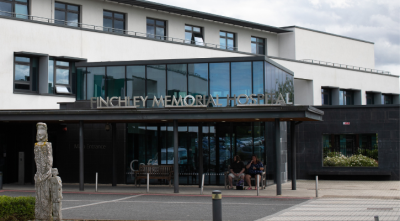The Royal Free London is a national provider of scleroderma care.
Our scleroderma team is linked with University College London, offering ongoing clinical care (sometimes in partnership with your local rheumatologist), a range of clinical trials, and undertaking extensive research into the disease.
Email: rf.
Scleroderma pathway manager
Tel: 020 7472 6201, then select option 3.
PITU intravenous infusions
Tel: 020 7317 7507.
Email: rf-tr.
Scleroderma patient navigator
Tel: 020 7472 6201, select option 4.
Clinical advice line
Tel: 020 7472 6200.
Repeat prescriptions and blood monitoring
Tel: 020 7472 6200.
Biologics, homecare prescriptions and blood monitoring
Tel: 020 7472 6200.
Scleroderma patient support
Tel: 020 7794 0500, extension 34065.
Line open: Wednesdays only.
Email: Kim.
Digital ulcers are ulcers that develop on the fingers and toes. The clinic provides patients with treatment and management of digital ulcers by our specialist nurses.
Telephone 020 7472 6200 to arrange an appointment.
Scleroderma is an autoimmune condition that affects the skin and connective tissue.
A person living with scleroderma will have an overactive immune system, meaning the body attacks its own healthy tissues, causing hardening and scarring.
Scleroderma is an umbrella term that refers to the various types of this rare and complex condition. It comes from two Greek words: 'sclero' meaning 'hard' and 'derma,' which means 'skin'. Hardening of the skin is often the first sign that people notice, which occurs because the body is producing too much collagen.
It is thought around 2.5 million people worldwide are affected by scleroderma, which can range from mild to severe and in some cases may even become life-threatening.
Every person’s story is unique and no two cases are ever identical.
Types of scleroderma
How an individual will be affected by their condition will depend on the type of scleroderma they have.
There are two main types of scleroderma: localised scleroderma and systemic sclerosis.
Localised scleroderma will mainly affect the skin, and for many people this is a milder form of the disease.
In systemic scleroderma (systemic sclerosis), some of the internal organs are involved as well, such as the heart, lungs, or kidneys.
Raynaud's phenomenon is often a common symptom of both types of scleroderma
As part of our scleroderma service, we facilitate a nurse-led primary Raynaud’s service that accepts referrals from GPs, consultants and trainees from across the UK.
The clinic provides patients with a service dedicated to the assessment of new onset or long-standing Raynaud’s phenomenon.
It comprises of a clinical consultation and has direct access to the designated phlebotomy service.
Patients will also see the departmental clinical scientist for capillaroscopy and thermography to determine clinical significance. The coordination of these tests within the same clinic appointment offers a seamless service to provide a quick diagnosis.
The close link with the scleroderma clinic will ensure a prompt referral of cases that progress to a connective tissue disease.
Patients will receive verbal and written information on their condition, including risk factor advice, lifestyle modification and medication. All patients will be provided with a contact telephone number for the nurse-led advice line, which provides ongoing support and information.
The UK scleroderma study group (UKSSG) is a working group comprising of key centres with a clinical and research interest in scleroderma.
The group was established by Professor Dame Carol Black on the principle of inclusive participation.
Any clinician with an interest in scleroderma and a wish to be involved in the research activities of the group is invited to join.
It meets formally twice each year. A key role for the group is to foster collaborative research, and a series of recent studies in the UK have used the UKSSG infrastructure to facilitate collaboration.
If you would like to take part in any of our scleroderma studies or would like some additional information, please contact the clinical team:
Email: rf-tr.
Tel: 020 7317 7544.
Ongoing trials
Ongoing and new scleroderma studies we are recruiting patients include:
BLISS-ILD GSK
Study focuses on testing a drug called Belimumab to treat diffuse scleroderma. The study will evaluate how well the study drug works and how safe and how tolerable it is for patients.
Athena
Study is testing a drug called PRA023; which is a humanised immunoglobulin G monoclonal antibody (man-made antibodies that act like human antibodies) in patients with diffuse scleroderma. PRA023 can potentially improve the symptoms of scleroderma associated with interstitial lung disease and prolong survival.
Horizon
Study is testing a drug called HZN-825, to treat diffuse scleroderma. The study will evaluate how well the study drug works and how safe and how tolerable it is for patients.
Horizon OL (BEACON)-302
This is an open label of the above Horizon study.
Genentech
Study is testing a drug called RO7303509, to treat scleroderma. The study will evaluate how well the study drug works and how safe and how tolerable it is for patients.
BI VITALISScE
Study is testing a drug known as BI 685509. The study will evaluate how well the study drug works and how safe and how tolerable it is for patients.
Daisy
Study is testing a drug called Anifrolumab, to treat scleroderma.
CoDUo
Study aiming to co-design scleroderma digital ulcer self-care interventions and improvement opportunities with patients and healthcare professionals.
SPIN
Study aims to learn about important problems faced by people living with scleroderma (e.g., fatigue, emotional distress, physical limitations) and to develop and test internet-based interventions to support people living with scleroderma.
HANDSOME
Study aims to explore hand function impairments in scleroderma.
Studies starting soon or early 2025
CONQUEST SRF-201
Study will be testing a drug called Amlitelimab or BI 1015550, to treat scleroderma patients with interstitial lung disease, whether have limited or diffuse scleroderma. The study will evaluate how well the study drug works and how safe and how tolerable it is for patients.
Dermatomics
Study will focus on obtaining skin biopsies on patients with scleroderma for further testing.
Bliss OL MUSC 63679
An open-label extension of the BLISS-ILD GSK study.
BAFF-R
Study will be testing a drug called Ianalumab in patients with diffuse scleroderma. The study will evaluate how well the study drug works and how safe and how tolerable it is for patients.
Inflammation, tissue repair, scarring and fibrosis have an essential and important role in the normal biological processes of cells, tissues and organs. They are also involved in some of the most common and severe diseases.
The FLARRE consortium seeks to better understand the processes involved in these disorders and support the management and treatment of such conditions.
It unites basic, biomedical and clinical scientists at all levels from across University College London (UCL) with industrial and international collaborators.
FLARRE aims to highlight research in inflammation, tissue remodelling, scarring and fibrosis, to develop a UCL cluster of expertise and research excellence.
This is translated into commercial enterprise, leading to improved patient care.
GPs can receive prompt advice and guidance for any rheumatology query from a rheumatology consultant, from Monday to Friday, via the NHS e-Referral Service — please include any relevant documents, such as letters or photographs, in messages. Tertiary referrals from other hospitals are also accepted.
A reply is guaranteed within three working days.
Scleroderma and Raynaud’s service referral information
Referrals should be made by UK rheumatology services in writing and sent to rf.
Scleroderma and Raynaud’s patient information and education
The scleroderma service has received funding from the Royal Free Charity, including towards an ulcer project, which you can read more about on the charity's website.
 Translate
Translate








